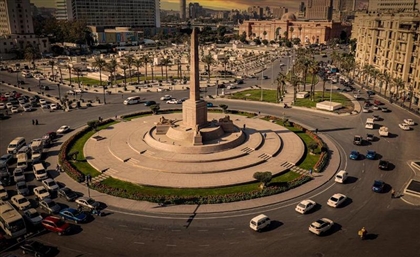Bolitics; SCAF's Genius
I, like many, was shocked upon hearing the news that, all of a sudden and without protest, Tantawi and Annan were removed by Morsi after years in power. The same Morsi who only days prior looked like he had all the power of a bamia...

If you start thinking logically, this was a fantastic move by SCAF, an institution which is clearly used to thinking in decades and not months. What seems to the public like Morsi all of a sudden growing a fairly substantial pair might in fact be quite the opposite.
How did I get to this conclusion? Well, I started looking at the facts and taking them to their logical ends. We, for instance, know that Tantawi was not very well liked amongst his peers; in fact many argue the reason he was made head of SCAF was because Mubarak trusted him more than others due to his unpopularity. At the end of the day, the multi-member SCAF is made up of men, and when I say men, I am referring to their fallibility and ambition. Years of being under the thumb of Tantawi must of course have led to some serious friction which, although placated with what I assume to be enormous bank balances, will never be enough to stop younger members from reaching for the stars should the opportunity arise.
Over the last year the Army which had enjoyed almost God-like status among the people, started its slow descent into reality and, more importantly, accountability. When SCAF took the reigns, it was clearly faced with two options – an immediate seeding of power into civilian hands and essentially admitting that the time of the separate state of the military was at an end or, option 2: go for broke. The idea was to let the public see the threat of the Muslim Brotherhood as a possible reality and attempt to get yet another general into power. The theory was based on the assumption that the public would be scared but at the same time have faith and pride in its army which had ushered a relatively bloodless toppling of Mubarak.
This is where I believe the cracks within SCAF started to appear; younger members, including El Sisi (it’s important to note he was the likely successor to Tanawti, more on that later), probably started raising concerns that Egyptians would not accept it. These objections were clearly snuffed out as at that point there was no catalyst or incident to base these objections on. What SCAF underestimated was:
1) The publicity machine that the Muslim Brotherhood had created, something which the deep state was no match for;
2) The willingness of the Muslim Brotherhood to lie, duck, dive and pretend to let go of their core Islamic beliefs in order to form coalitions with other members of society.
No matter how much SCAF tried to explain the dangers of the Muslim Brotherhood through their old school channels, people were too sucked into Muslim Brotherhood propaganda and too unwilling to accept SCAF, even if they knew that they had a point, as the perception was it would be a step backwards.

Fast forward to the Sinai attacks. Tantawi clearly had been playing a waiting game. All he had to do was hold out until the public got sick and tired of little progress, unfulfilled promises and a lack of security. Unlike many, I believe Tantawi saw the Sinai incident as a positive thing. While many journalists quipped that it was proof of SCAF’s ineptitude, the people on the streets were actually turning to SCAF for reassurance and starting to feel the reason for their existence again. Nothing brings together a nation like war and I believe Tantawi wanted Egypt to look upon him as the man who cleaned up Sinai from Islamist extremism. This incident probablly emboldened him into completing his objective of returning a military man to the presidency. Using the August 24th protest as a signpost to future unrest, I think it would have only been a matter of time before the tanks inevitably rolled in and the army dully announcing something along the lines of martial law. This would have NOT been followed by an all-out coup, but SCAF would have probably forced Morsi’s hand out of the constitution and accelerated parliamentary and presidential elections.
While on paper the above might look great to those who are weary of the Muslim Brotherhood, the reality would have probably been more like this:
- Army rolls in,
- Muslim Brotherhood use publicity machine to start saying military coup,
- Muslim Brotherhood mobilise on the streets,
- Muslim Brotherhood make the call to arms to all other political elements to protect the revolution,
- Many non-Morsi supporters would join such protests against the military,
- Whispers of removing SCAF all together would start appearing, followed by outright calls for the president to become the DIRECT commander and chief of the Army
- SCAF would then know their only option would be a street war, which they could never win, or to essentially give up quietly and not risk going down the toppled dictator route.
Predicting the above, I believe El Sisi and the other members of SCAF far more in-tune with reality decided at this point to stage their own internal military coup, which would explain why Tantawi went quietly. Golden parachutes were given out and new, younger members promoted.
I think Morsi in fact had nothing to do with what occurred. I believe the decision was formally told to Morsi after it was agreed upon and Morsi was told he could play it in anyway he wanted. However, when you look at what’s really changed within the army, it’s actually nothing, essentially returning itself to how it was under Mubarak. What happened was just a standard, albeit early, generation change by people who were likely to be promoted into those positions anyway. SCAF returns back to what it does best, silently working in the background with its only interests being self-preservation and general state security. Morsi presented with this news and ran with it – it was the perfect thing to boost his rapidly waning popularity on account of the improbable promises he said he could fulfil in 100 days and general distrust of the MB.
Ironically, this plays into SCAF’s hands even more. To the public, Morsi really does appear to be in charge and, to quote Spiderman, “with great power comes great responsibility.” I am positive Morsi did not want this to happen this early. To clarify, whoever came to power for the first post-revolution presidential term is a guaranteed lame duck; there is absolutely no way any president could come anywhere near solving problems in one term. It’s likely that Morsi was hoping to share power with as many people as possible and deflect the blame off the Muslim Brotherhood until they could have a tighter grip on things. Now everyone has the Muslim Brotherhood in their cross-hairs as SCAF goes through an internal power shift. They can’t deflect blame and attribute it to not having total political power, they can not blame a deep state which no one will believe can exist anymore and, most annoyingly for them, their PR machine which was so good at stating how the deep state functioned has now turned against them. This was evident when they tried to use state media to control the public. Unfortunately for Morsi and his party, the people have become too aware of these tactics.
SCAF now has actually become more powerful. It knows the US distrusts the Muslim Brotherhood and will benefit from this with increased direct funding. It no longer has the worries of the political game and the more time it spends out of the spotlight, the more its reputation is repaired. SCAF is far more dangerous to the Muslim Brotherhood now as it has become the unseen enemy; it has the biggest stick, and if called upon by the people to remove the MB, it will have legitimacy to do so without being protested against. More likely however, SCAF has just secured its existence as an “army with a country” for the next 30 years. GENIUS.
At this point, they really don’t fear an Islamist take-over as the country is too divided for that to happen without what would essentially be another revolution. As an institution which thinks in decades and not years, I believe they see the Islamists as a blip which will eventually be integrated into more moderate form accepted by the people, leaving SCAF as Egypt’s very own super-power.
- Previous Article I Got Banged!
- Next Article Get Real
























